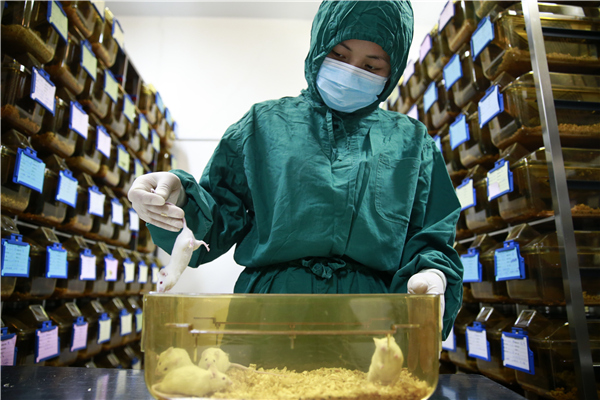National lab animals standard on the way
 0 Comment(s)
0 Comment(s) Print
Print E-mail China Daily, March 18, 2016
E-mail China Daily, March 18, 2016
 |
|
A researcher checks the conditions of rats used for laboratory tests at the National Institute of Biological Sciences in Beijing. [Photo/China Daily]? |
China is expected to adopt its first national standard on laboratory animal welfare and ethics by the end of the year. This will mark a major legislative breakthrough for the protection of animals used in research and testing by the pharmaceutical and other industries.
The draft, which is available for public opinion until Sunday, is expected to greatly improve the welfare of laboratory animals in China, according to Sun Deming, chairman of the Welfare and Ethics Committee of the Chinese Association for Laboratory Animal Sciences.
"Although all users of laboratory animals are required to conduct welfare and ethics reviews, they adopt different standards, and some are too lax," Sun said.
Qin Chuan, the association's president, said the lack of legislation has become a bottleneck for the development of China's multibillion-yuan biological and pharmaceutical industries and other industries related to the use of laboratory animals.
The new standard, which aims to minimize the use of animals and also their pain, integrates the latest concepts and requirements for the ethical treatment of lab animals, Sun said.
It has been recognized by leading experts at home and abroad, Sun said during the two-day Sino-British Third International Seminar on Laboratory Animal Welfare and Ethics.
The conference in Hefei, Anhui Province, which was co-hosted by the association and the British government, ended on Thursday.
"We drew on experiences and lessons in the legislation of laboratory animal welfare from other countries, such as the UK, when drafting the standard," Sun said. "If carried out, it will be of epoch-making significance for China's laboratory animal welfare and ethics."
The draft includes requirements for the production, transportation and use of laboratory animals, including qualifications for personnel, animal-raising facilities and the use of animals in testing.
About 20 million laboratory animals, mainly mice, are used annually for testing in China, according to Yue Bingfei, director of the Laboratory Animal Monitoring Center at the National Institutes for Food and Drug Control. Sun said that although China is a major producer and user of laboratory animals, there is hardly any legislation on their welfare, and no specific government department supervises animal welfare.
In one recent case, Xi'an Medical University in Shaanxi Province suspended surgeries on animals in December after it was found that some dogs had been abused and their carcasses mishandled during research.
An anonymous microblog that posted photos of more than 10 dogs bleeding on the roof of a university building went viral, drawing criticism and concern.
Qin said the lack of welfare and ethics standards affects the health of laboratory animals, which in turn affects the results of scientific experiments and the quality of products.
She said it also leads to some Chinese academic achievements being rejected by leading international institutions and also prevents some Chinese products, such as cosmetics, from being sold in international markets.
Mark Prescott, head of research management and communications at independent scientific organization NC3Rs in the UK, said promoting animal welfare in China can help Chinese scientists to collaborate internationally. It will also benefit companies, as they can produce products safely and efficiently and market them better.
China is making progress in promoting the welfare of laboratory animals.
Lin Qingbin, an engineer at the Drug and Cosmetics Registration Management Department at the China Food and Drug Administration, said domestic producers, for example, have been allowed to market commonly used items, such as shampoos and perfumes, without animal testing since 2014.
But according to scientists, China is weak in the research of alternative methods to using laboratory animals, making the abandonment of animal testing impossible in the near future.
More than 300,000 people are employed in industries that use animals for testing.





